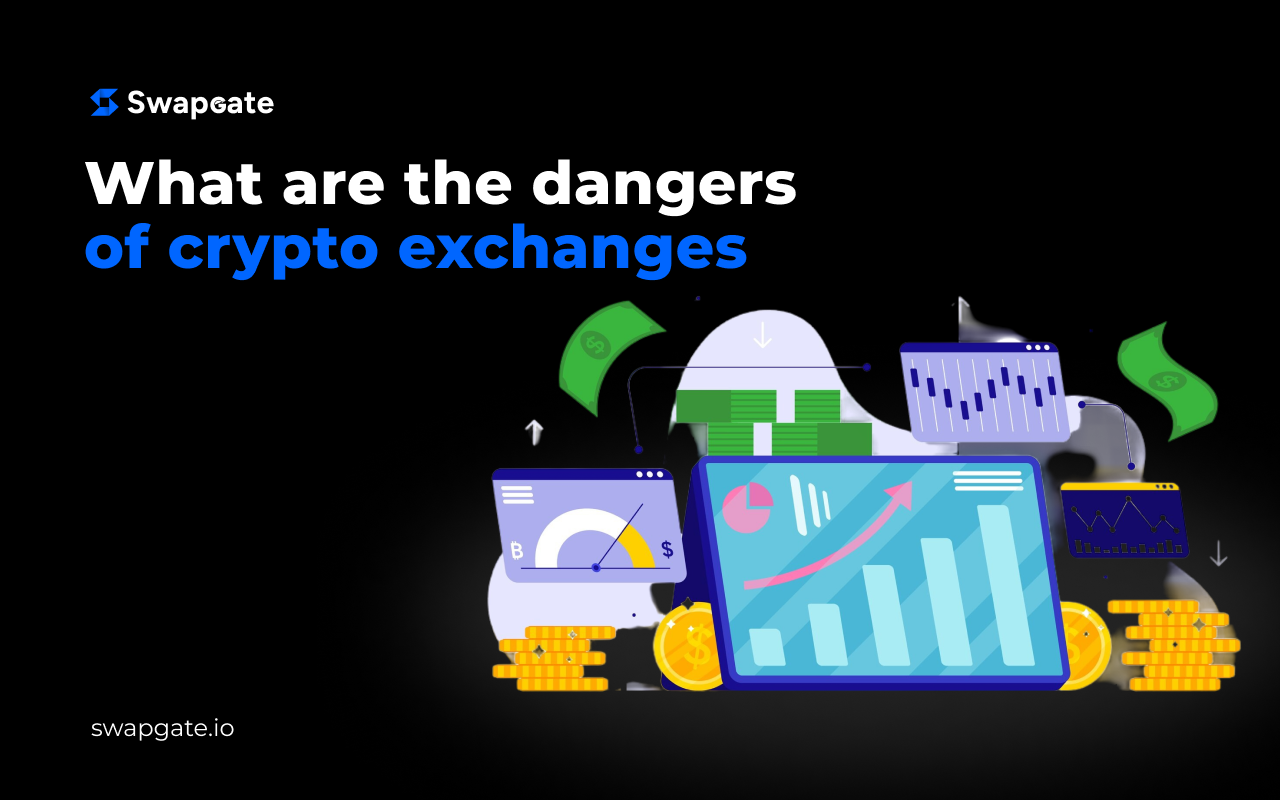
Cryptocurrency exchanges are a vital part of the digital ecosystem, offering users worldwide the ability to trade tokens and conduct various cryptocurrency operations. Despite their significance, numerous risks overshadow the user experience. Let’s examine the reasons behind their popularity, identify the drawbacks of cryptocurrency exchanges, and explore ways to protect your funds.
What are exchanges?
Cryptocurrency exchanges are platforms for buying, storing, selling, and exchanging digital currencies. Their operation is similar to traditional exchanges, but they use cryptocurrencies like Bitcoin and altcoins.
Exchanges can be centralized (CEX) or decentralized (DEX). The difference is that centralized exchanges are regulated by an organization, while decentralized exchanges are managed by blockchain and smart contracts. DEXs are considered more secure and are popular among users.
Reasons for the popularity of cryptocurrency exchanges
Primarily, the popularity of exchanges is based on their wide functionality and convenient access to features:
- A large selection of trading pairs allows users to exchange the necessary assets and always have access to popular coins.
- An intuitive interface opens up trading and earning on cryptocurrency even for beginners.
- High liquidity in CEXs makes fast buy/sell orders available.
- Margin trading, lending, staking, and access to ICOs—thanks to additional services, the exchange offers many useful functions.
Why don’t exchanges earn unconditional trust?
The convenience and special features can create the illusion that cryptocurrency exchanges are the perfect trading tool. But this is not the case. They are prone to hacks and thefts, periodic failures, and high-profile scandals with regulatory services.
One of the most notorious hacks occurred in 2014 when the Japanese exchange Mt. Gox lost funds amounting to 850,000 BTC. Thousands of users fell victim to the hack, and the exchange went bankrupt. Only now, 10 years later, are some victims starting to receive compensation.
In 2018, another Japanese exchange became the victim of a hacker attack. As a result, Coincheck users lost over $530 million in NEM cryptocurrency.
Equally scandalous was the theft of funds from Binance accounts—one of the largest cryptocurrency exchanges. In 2019, hackers stole more than $40 million by gaining access to the platform’s hot wallets.
The well-known exchange FTX was forced to cease operations due to bankruptcy and fraud by its founders. In 2022, user assets were frozen, causing many financial losses.
Thus, even large and well-known exchanges that have earned their reputation over many years and seem stable can leave you with nothing at any moment. The main reasons include:
- Centralized storage of large volumes of funds. Most often, cryptocurrency on exchanges is distributed between hot and cold wallets, making them an attractive target for skilled hackers.
- It is impossible to account for all technical aspects 100%, so software errors often cause crashes.
- Lack of regulation in CEXs is a problem when it comes to ensuring the security of user funds.
How to protect your funds?
The best advice for safeguarding funds when using an exchange is “not to store funds on the exchange.” If you have large sums on your accounts, it’s worth using hardware wallets with a high level of security. These can be well-known models that have proven effective, such as Ledger Nano S, Ledger Nano X, and Trezor.
Software wallets installed on your device (phone, tablet, or computer) can also ensure security when used correctly. These include Exodus, MEW, and others. Be sure to use 2FA authentication and regularly update software to protect your data.
If you need to quickly exchange your funds, you can use an alternative to exchanges—a cryptocurrency exchanger. With SwapGate, you can exchange cryptocurrency in a few clicks without unnecessary confirmations. Choose the desired pair, specify the wallet address, and follow the on-screen instructions. After the exchange is completed, the cryptocurrency will be sent to the specified address, allowing you to make a secure exchange.
Conclusion
Despite the importance of cryptocurrency exchanges in the digital economy, they remain vulnerable and unreliable even in 2024. Before starting to use exchanges, familiarize yourself with potential risks to protect your funds. Safe storage of cryptocurrency using hardware wallets and reliable exchange platforms like SwapGate.io can significantly reduce risks and ensure the safety of your assets.
FAQ
What are cryptocurrency exchanges?
Cryptocurrency exchanges are platforms for buying, selling, and exchanging cryptocurrencies.
Why are cryptocurrency exchanges popular among users?
Exchanges offer a wide range of trading pairs, user-friendly interfaces, high liquidity, and additional services such as margin trading and staking.
What risks are associated with using cryptocurrency exchanges?
Major risks include hacks, failures, internal vulnerabilities, and lack of regulation, which can lead to the loss of user funds.
How to protect your funds when using cryptocurrency exchanges?
It is recommended to use hardware wallets, software wallets, and cold storage methods. It’s also important to use two-factor authentication and regularly update software.
How to easily exchange cryptocurrency on SwapGate.io?
To exchange cryptocurrency on SwapGate.io, you need to register, select the currency, specify the exchange amount, enter the wallet address, and confirm the transaction. The exchange takes a few minutes.